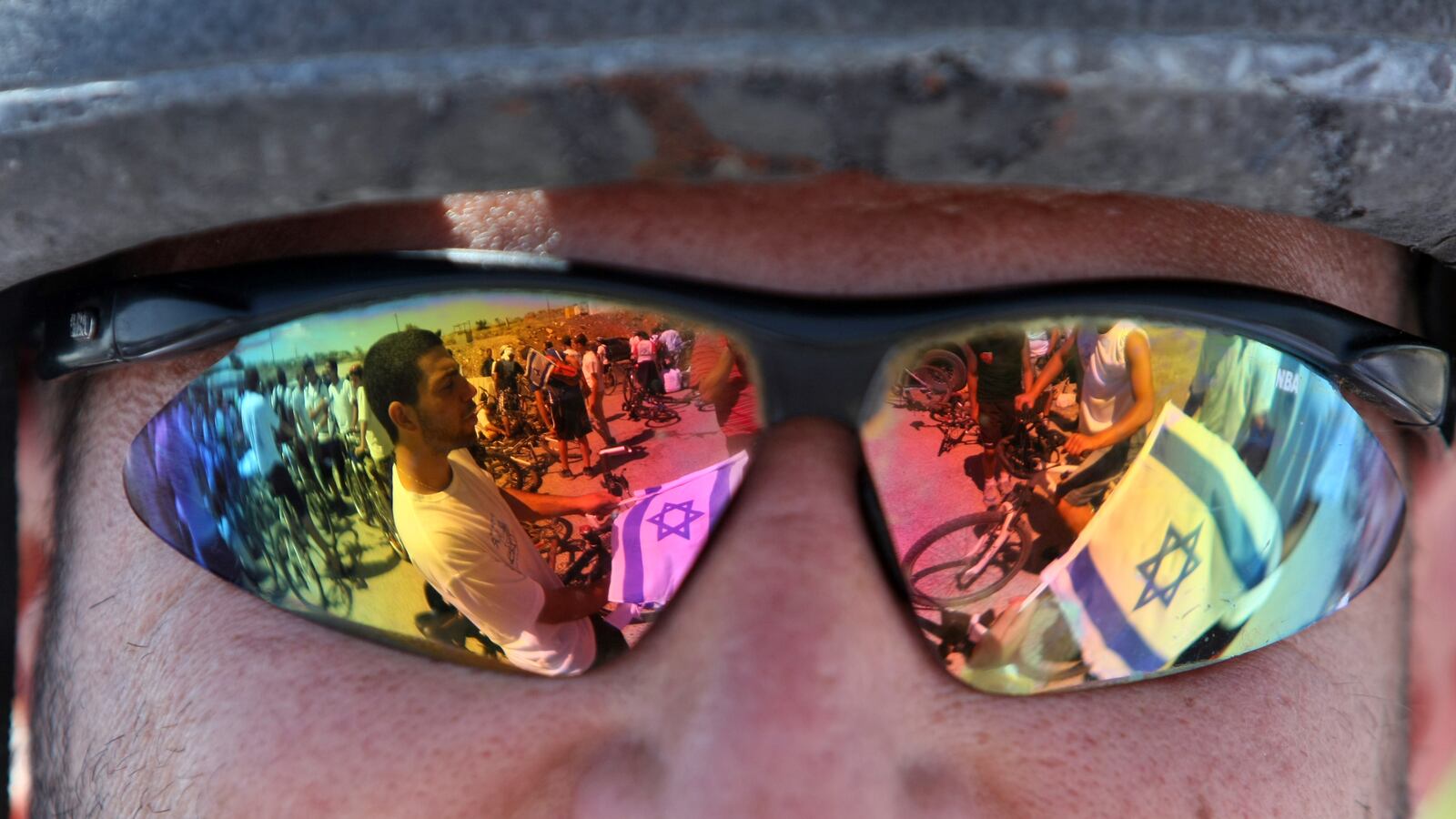Out for my morning bike ride yesterday, I looped up the ridge to Kibbutz Ramat Rachel on the south edge of Jerusalem. Two flocks of teenagers were coming down: the first dressed in white shirts, dark pants and crocheted skullcaps, the second in knee-length skirts and modest blouses. They carried many Israeli flags that waved in a cool mountain breeze, the kind of breeze that is much more common in myths about Jerusalem than in real life and that seemed to have been ordered up special for Jerusalem Day, which is all about myth and not reality. They headed toward the center of town, presumably for the procession into the Old City—a Jerusalem Day custom observed mainly by youth from the religious Zionist right, who inherit hand-me-down Israeli mores when everyone else but right-wing politicians tire of them.
A bit further north, I found many more tourist buses than usual parked next to the promenade that straddles the former no-man's land between East and West Jerusalem. On the promenade, with its panoramic view of the city, guides lectured to groups of schoolchildren, IDF soldiers, and overseas students. I stopped at discreet distances from them to listen. One guide began his riff with David conquering Jerusalem and making it the center of the Jewish nation. Another quoted Psalm 137 to speak of the Jews exiled in Babylon longing for Zion. I caught snippets of more recent history, too, such as accounts of the Six-Day War.

Jerusalem Day celebrates the Israeli victory in that war by commemorating the conquest of the Old City on the third day of fighting, the 28th of Iyar on the Hebrew calendar. Mainstream politicians mark the day by making speeches about the outcome of the war that's supposed to be a matter of Israeli consensus: the unification of the city. Zionist rabbis declared it a religious holiday, complete with recitation of hallel, the psalms of praise for an act of divine redemption.
What's missing in the Jerusalem Day narrative, what was missing in the guides' spiels, is exactly what makes Jerusalem irresistible to some people and unnerving for others: Its multiplicity of histories, its fractures, its confusion. From the same promenade, a guide can point to churches and the Dome of the Rock, which not only marks where Solomon built his temple but also the sanctity that Islam finds in the same city. From the same promenade, a guide can call attention to Palestinian neighborhoods and to the high concrete security wall cutting through them on the eastern hills.
More precisely, what's nearly missing from the Jerusalem Day story are the city's Arabs, its Palestinians. At best they are scenery, urban counterparts of the peasants and Beduin whom Moshe Dayan romanticized in his memoirs. At worst, they are obstacles to full Jewish rule, to be shown who rules here by the crowds of youth who dance through the Muslim Quarter with Israeli flags on Jerusalem Day. For most Israelis, by now, Palestinians are just another reason, along with the ultra-Orthodox, not to visit or even think realistically about a city where people are scarily different.
Cycling past the guides and their on the promenade, I wished I could take them for a tour of disunited Jerusalem: It would include a visit to the nearest Palestinian neighborhood, where only a few streets have wisps of sidewalk. It could include a conversation with a Palestinian friend of mine whose mother didn't leave the house for two years after his father died for fear of losing her widow's pension from the equivalent of Social Security. As an East Jerusalemite, a resident but not a citizen of Israel, she was entitled to the benefit. But if an inspector showed up when she wasn't home, he'd "confirm" she'd left the city and lost her residency. Economically, bureaucratically, socially, Jerusalem has never been united. Ehud Olmert, the glad-handing, cigar-puffing former mayor and prime minister who experienced a late-life revelation that eternal occupation was untenable, said as much in front-page interview yesterday.
Last week on this blog, Jill Jacobs suggested that Jerusalem Day might be saved through reinterpretation. As a religious Jew, I appreciate the value of pouring new meanings into old rituals. But I don't think that this holiday can or should be saved in the study hall.
Rather, the facts on the ground must change. The attempt to unify Jerusalem by fiat—by annexing the land while trying as mightily as possible to ignore the people, their needs and their desires—was mistaken. Jerusalem needs a diplomatic agreement that leaves it open physically but divided politically between two states. When it happens, I'd like to commemorate that day—modestly, without claiming that it heralds redemption, but with thanks and hope.






